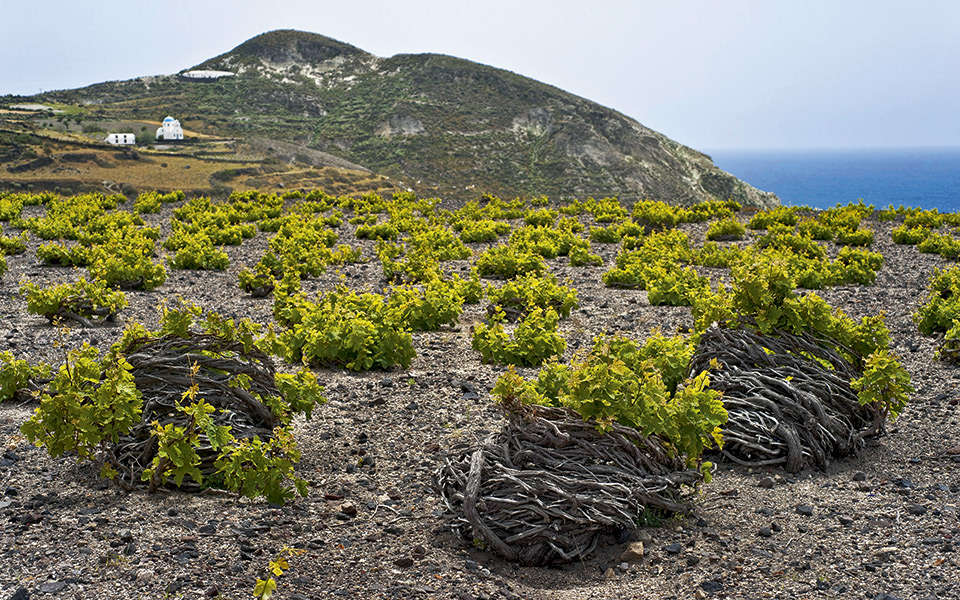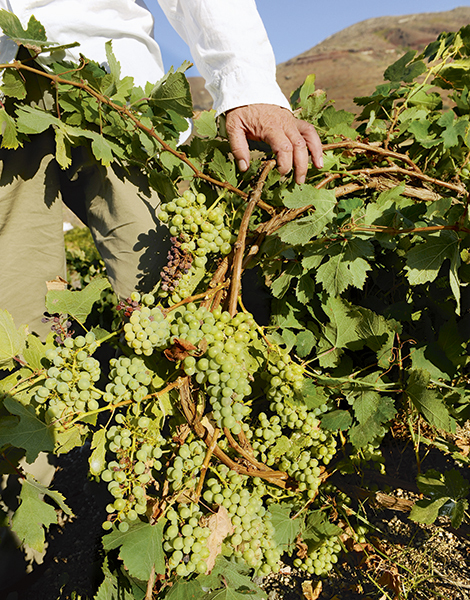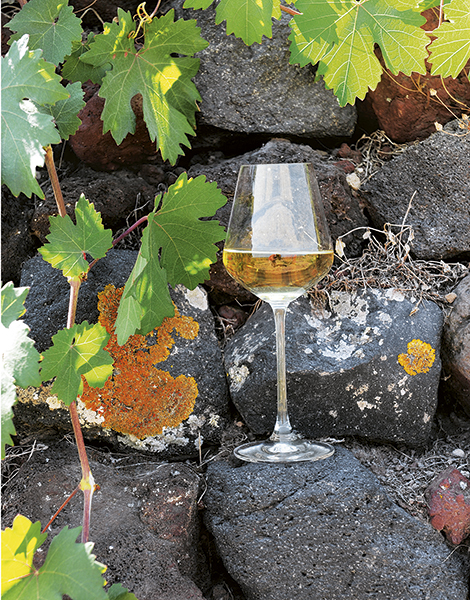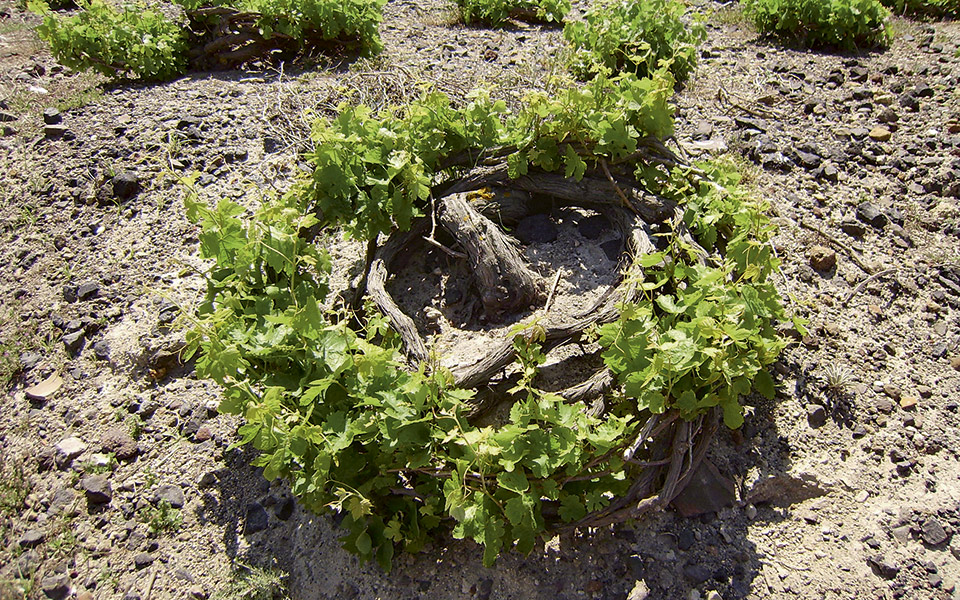5 Magical Open-Air Cinemas to Visit on the...
From Samos to Crete, we've selected...

A veritable living monument of global cultural heritage, Santorini’s vineyards are the world’s oldest, with a root system that can be traced back four centuries.
© Shutterstock
There have been many exciting moments during my 27-year career in the service of Greek wine, but two in particular stand out as really exhilarating, and both feature Santorini’s Assyrtiko variety.
The second and most recent of these took place just a couple of years ago, when Jancis Robinson presented her new book, Wine Grapes, on the Daily Meal website .
For those not in the know, Master of Wine Jancis Robinson is widely regarded as the preeminent authority today on all matters relating to vine and wine. To put it simply, when the British expert speaks, we, the people of the wine world, sit up and listen.
In the book, Robinson provides an in-depth description of no less than 1,368 wine grapes, ranging from widely popular varieties to several that are almost universally unknown. Towards the end of her presentation, she was asked to single out one variety from the 1,368. Just one. Hearing the question and familiar with the idiosyncrasies of British reserve, I expected Robinson to be evasive, diplomatic. How wrong I was! She did not hesitate for an instant, naming a variety, which, in her own words, “makes the most stunning white wine,” Santorini’s Assyrtiko.
Readers without a profound knowledge of the world of wine may not appreciate the gravity of this statement. To a soccer fan, it would be like hearing Pep Guardiola say Greece will win the World Cup.
“[Robinson] did not hesitate for an instant, naming a variety, which, in her own words, “makes the most stunning white wine,” Santorini’s Assyrtiko.”

The combination of an arid climate and strong winds has resulted in grapes that are true survivors.
© Vangelis Zavos

In other parts of the world, Assyrtiko yields pleasant whites that appeal to many palates. In Santorini, you either hate the Assyrtiko wines at once, or love them forever.
© Vangelis Zavos
My first exhilarating experience was a few years earlier, at the change of the millennium. I was at the home of Stavroula Kourakou-Dragona, the doyenne of Greek wine and savior of the Greek vineyard, together with about a dozen oenologists. We opened a bottle of Assyrtiko from 1847. Imagine our astonishment when we realized that what we had before us was in fact a “new” wine that was 153 years old. And at that precise moment, we became aware that we were dealing with a variety like no other, a variety that was almost completely unknown, begging for attention and a new approach.
Let us go back about a quarter of a century. It is 1986-87 and vintner Yiannis Boutaris discovers both the potential of Santorini as a vine-growing region and its endemic Assyrtiko variety. He immediately embarks on the construction of a state-of-the-art winery and strives to convince us of something he has only just realized, namely that Santorini’s Assyrtiko is an amazing grape capable of yielding excellent wines. At the time, of course, we could only trust in Boutaris’ intuition, as the wines being produced by the island’s smattering of wineries were, by current standards, anything but great.
A great deal has changed since then. A handful of oenologists and vintners threw themselves into the task of producing and promoting Assyrtiko on the international stage, ultimately leading to Jancis Robinson’s astonishing statement.
The efforts of winemakers on Santorini, myself included, were focused in the early 1990s on applying established state-of-the-art techniques. More recently, we have gone on to fine-tune these techniques to develop the individual personality – style, if you will – of each of Santorini’s 14 wineries.
On the cultivation front, our interventions for Assyrtiko were minimal, and there is good reason for this. In contrast to other wine-growing regions in Greece, where evolving cultivation methods was the key to improving quality, on Santorini the methods were more or less predetermined centuries before, leaving little room for maneuvering. In effect, all we had to do was respect the age-old system of Assyrtiko cultivation, and that’s exactly what we did.
“At that precise moment, we became aware that we were dealing with a variety like no other, a variety that was almost completely unknown, begging for attention and a new approach.”

The so-called kouloura technique involves training the vines low on the ground and protecting the grapes in a wreath of stems and leaves.
© Vangelis Zavos
Nowhere else in the world do we come across the rare combination of vine, earth and climate that is present on Santorini, a combination that includes volcanic, mineral-rich soil, a climate profile that is essentially arid (forcing the vine to send its roots deep into the earth to find life-giving water), and a white variety – Assyrtiko – that is so perfectly adapted to such extreme conditions of survival. To this, we must also add a singular cultivation technique that the island’s vine growers have been developing for centuries. It is a painstaking system that results in vines that look more like works of sculpture than products of nature (visitors will often walk right past one without knowing what it is), yet one which allows the vines to emerge victorious from the incessant battle against strong winds and the searing sun.
The result is a veritable living monument of global cultural heritage, the world’s oldest self-rooted vineyards with a root system that can be traced back four centuries and which yield impressive dry whites and the amazing sweet Vinsanto.
Today, Assyrtiko is grown in every corner of Greece, more or less, and I am quite confident that we will soon find it throughout the vine-growing world (it is already present in Australia). Outside Santorini, it yields lovely, aromatic and refreshing whites that appeal even to the uninitiated palate.
This, however, is not the case in Assyrtiko’s birthplace. The rare wines that emerge from Santorini’s volcanic soil are much like the island’s people: voluptuous and over-the-top in manner, with a character which you either dislike instantly or adore forever. Wines that are whites but have the attitude of a red. Wines that are rich in flavor with sharp and unexpected acidity levels, and a long, briny finish – qualities that allow myriad bold combinations with Greek and international cuisines, wines that challenge all stereotypes. These are the ultimate food wines. They may be difficult, even hostile at times, but they are also wonderful, rare and, why not, majestic.
If you think you know Santorini Assyrtiko, think again.
“The rare wines that emerge from Santorini’s volcanic soil are much like the island’s people: voluptuous and over-the-top.”
Yiannis Paraskevopoulos, PhD in Oenology from the University of Bordeaux II, is the cofounder of Gaia Wines.
From Samos to Crete, we've selected...
The Thessaloniki-born winemaker welcomes us to...
Discover Greece’s winemaking heritage with tastings,...
From Santorini sunsets to ancient ruins,...